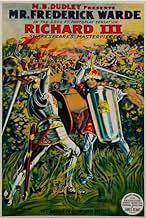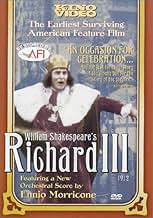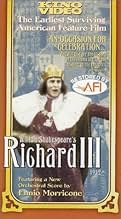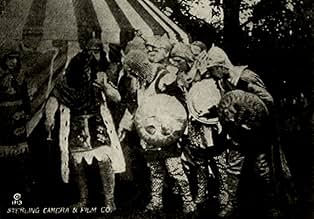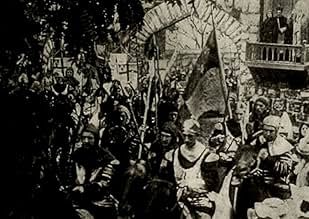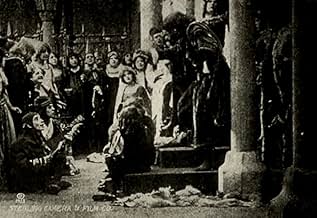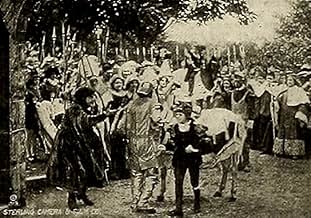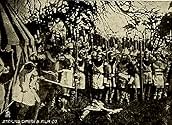Ajouter une intrigue dans votre langueRichard of Gloucester uses manipulation and murder to gain the English throne.Richard of Gloucester uses manipulation and murder to gain the English throne.Richard of Gloucester uses manipulation and murder to gain the English throne.
- Réalisation
- Scénario
- Casting principal
Avis à la une
Historically important as it is the oldest known complete surviving feature film made in the US, Richard III does a decent enough job of making Shakespeare's play accessible to the masses - although watching a Shakespeare play without words is like looking at a portrait in a dark room. The faces pulled by Shakespearean stage actor Frederick Warde suggest he thinks he's still playing to the Gods.
This was a very, very early full-length film. According to the video box, it was the first full-length American-made film, but that is debatable--as several films have made that claim and exactly what constitutes "full-length" is pretty vague. Regardless, I have to commend the cast for trying something unique and epic, though in today's light the film is a totally boring mess and only of interest to cinephiles. Instead of the modern notion of story-telling and action, the crew was breaking new ground and made a bizarre film that appears more like a series of vignettes instead of a coherent film. Instead of a moving and evolving narrative like we are used to, the film was made with a real-life traveling acting troop. But, instead of having them act out the story, the film shows inter-title cards that describe what has occurred and the cast pose like they are going to be photographed or just make a few minimal movements or actions until the next card appears to describe an all-new scene. It's almost like looking at a series of stereoscope cards that move just a little and all together tell a very, very dull story. Very static and horrid to watch, it DID try something different and this is an amazingly important film historically--I just would NEVER want to have to watch it again!
Watching Shakespeare without dialog isn't as challenging as you might think. Indeed, this 1912 film manages to condense the play neatly and still retains much of the power of the piece without hearing - or even reading - the words. Much of the success of "Richard III" is due to the vivid characterization by Frederick Warde, but his costars are excellent too. The direction is basic, of course, and every so often director-star James Keane wastes precious time (what's up with that long semi-tracking shot of the ship?), but generally his work is more than adequate. Comparing Keane's work here to the pioneering 1911 Italian feature "L'Inferno", it's clear that the American did have knowledge of what was going on elsewhere, even if he (of course) fell far short of what D.W. Griffith was already doing. Overall, "Richard III" will be of considerable interest to silent-film fans as well as stage performers interested in viewing the work of 19th century master Warde. Otherwise, I doubt this movie will thrill many other viewers. But I could be wrong; check it out for yourself.
Credited as the earliest complete feature-length American film known to still exist and restored by the American Film Institute, "The Life and Death of King Richard III" is otherwise of little value. Rarely is Shakespeare nearly as boring. Yes, the film is a symptom of its time; I also watched "Queen Elizabeth" (1912) today (it wasn't a very good day), and both are arid and static adaptations from the stage, histrionic acting included, but without sound, or any other qualities of the theatre. Films such as these, however, were coincident with films by others like D.W. Griffith; one can easily see which was advancing the medium and which was hampering it.
Like many a heralded silent movie, this was lost for many years. Then it turned up in a private collection, and was donated to the AFI. They got Ennio Morricone to write a score and released it, claiming it was the first American feature, and the first Shakespearean feature.
It's true enough that Shakespeare is credited as a writer, and it follows the events of his play, but to offer a silent version of Shakespeare with not one of his lines seems to me to avoiding the pith and purpose of Shakespeare. True, few can cite more than three lines: "A horse, a horse, my kingdom for a horse"; "Now is the winter of our discontent made glorious summer by the sun of York"; and "Was ever a woman in this humor wooed? Was ever a woman in this humor won?" And usually they don't understand the second and misquote the third as "Was ever a woman so rudely wooed?". This led me and a friend to plot a production with Groucho Marx as Richard, Margaret Dumont as Anne, with similar casting throughout.
Not one of Shakespeare's lines is offered, reducing the play to sheer pomp and pageantry. This avoids the problem that Richard is one of Shakespeare's worst-written characters: an enormously cynical, murderous, and successful politician until he becomes King, who then turns into an idiot; a cowardly and feeble hunchback who is a monstrously courageous and doughty warrior in war. All this in service of the Elizabethan-era truth that he should never have been king, and that her grandfather performed a valiant deed by slaying Richard on the battlefield.
The result is a movie made in the Illustrated Text style of movie making without quoting one line of text. There are lots of extras shaking spears. I suppose that's enough for people who want to say they've seen Shakespeare. As for Frederick Warde, who plays Richard here, he later wrote
"I found the action of the camera necessitated entirely different methods of acting from the stage. Spontaneity must be replaced by deliberation and concentrated expression take the place of words. I had much to learn and considerable to unlearn but the director and photographer were very considerate, although my ignorance of the necessities of the camera must have tried their patience almost to the limit."
Which brings us back to another popular Groucho quote. Enough said.
It's true enough that Shakespeare is credited as a writer, and it follows the events of his play, but to offer a silent version of Shakespeare with not one of his lines seems to me to avoiding the pith and purpose of Shakespeare. True, few can cite more than three lines: "A horse, a horse, my kingdom for a horse"; "Now is the winter of our discontent made glorious summer by the sun of York"; and "Was ever a woman in this humor wooed? Was ever a woman in this humor won?" And usually they don't understand the second and misquote the third as "Was ever a woman so rudely wooed?". This led me and a friend to plot a production with Groucho Marx as Richard, Margaret Dumont as Anne, with similar casting throughout.
Not one of Shakespeare's lines is offered, reducing the play to sheer pomp and pageantry. This avoids the problem that Richard is one of Shakespeare's worst-written characters: an enormously cynical, murderous, and successful politician until he becomes King, who then turns into an idiot; a cowardly and feeble hunchback who is a monstrously courageous and doughty warrior in war. All this in service of the Elizabethan-era truth that he should never have been king, and that her grandfather performed a valiant deed by slaying Richard on the battlefield.
The result is a movie made in the Illustrated Text style of movie making without quoting one line of text. There are lots of extras shaking spears. I suppose that's enough for people who want to say they've seen Shakespeare. As for Frederick Warde, who plays Richard here, he later wrote
"I found the action of the camera necessitated entirely different methods of acting from the stage. Spontaneity must be replaced by deliberation and concentrated expression take the place of words. I had much to learn and considerable to unlearn but the director and photographer were very considerate, although my ignorance of the necessities of the camera must have tried their patience almost to the limit."
Which brings us back to another popular Groucho quote. Enough said.
Le saviez-vous
- AnecdotesThought lost for decades, but a pristine print (believed to be the oldest known complete surviving feature film made in the US) was discovered by a private collector in 1996 and donated to the American Film Institute.
- ConnexionsFeatured in Keepers of the Frame (1999)
Meilleurs choix
Connectez-vous pour évaluer et suivre la liste de favoris afin de recevoir des recommandations personnalisées
Détails
- Date de sortie
- Pays d’origine
- Langues
- Aussi connu sous le nom de
- Mr. Frederick Warde in Shakespeare's Masterpiece 'The Life and Death of King Richard III'
- Lieux de tournage
- Sociétés de production
- Voir plus de crédits d'entreprise sur IMDbPro
Box-office
- Budget
- 30 000 $US (estimé)
- Durée
- 55min
- Mixage
- Rapport de forme
- 1.33 : 1
Contribuer à cette page
Suggérer une modification ou ajouter du contenu manquant

